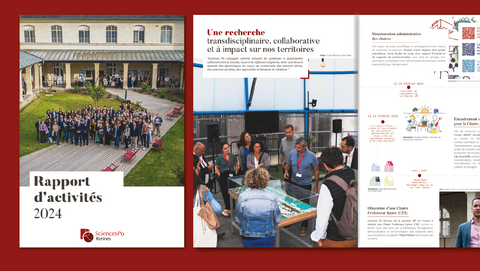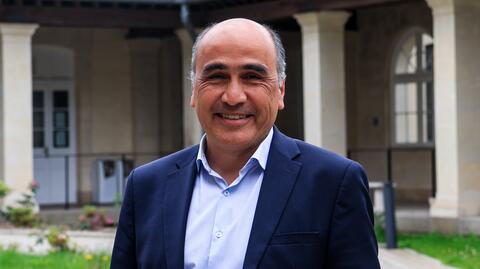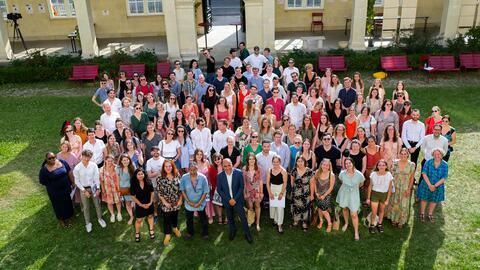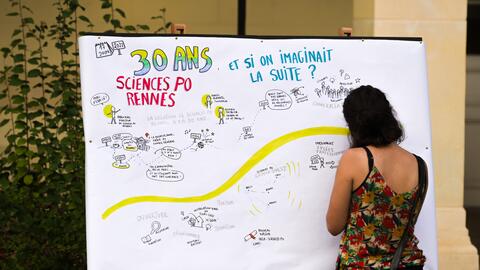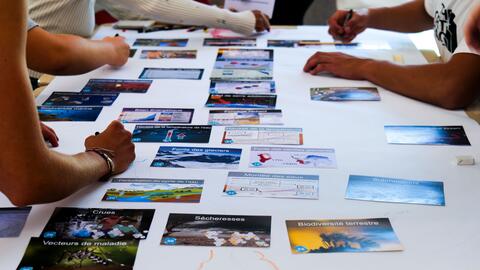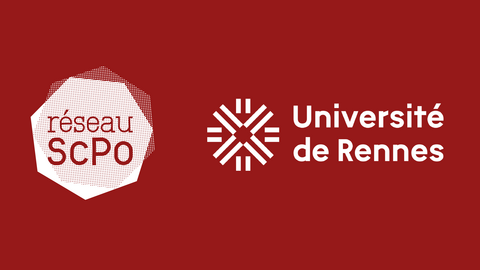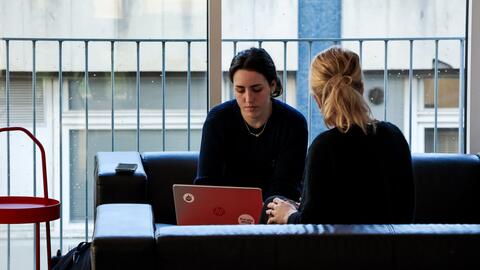Welcome to the Cloister! Rennes campus students like to meet here after class when the sun is out. Would you like to know more about our school and public education in the political sciences? This page provides answers to the many questions you may have.
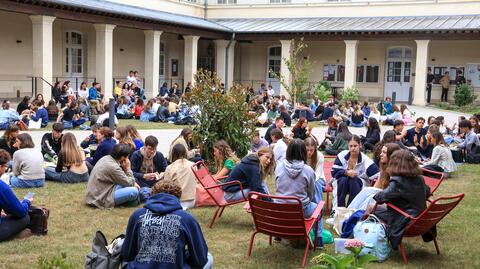
A school anchored in people, to never stop learning and care for the world, together.
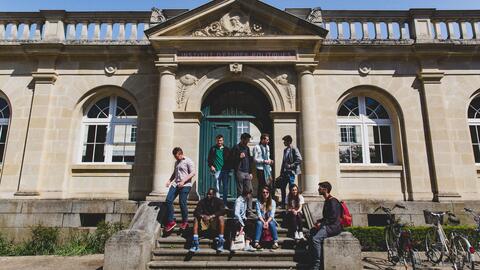
A humanist, public Grande Ecole
Sciences Po Rennes is a public and selective higher education institution driven by [French values] and the highest standards of learning. Sciences Po programs of study are built on a multidisciplinary foundation of law, sociology, history, economics, management, geography and languages. Lectures and tutorials transmit the general knowledge and methodology needed to better grasp the challenges of today’s world and take part in its transformation. The Sciences Po degree is a five-year . The third year of study is completed abroad, and students are given time to choose their path before deciding on a major in the fifth year of study.
Admission to Sciences Po is based on a competitive entrance exam and on principles of widened access and equal opportunity. Enrollment is free for scholarship students (who represent 35% of our student body) and help in preparing for the exam is available via the equal opportunity program.
“Never stop learning”
Innovative teaching has made Sciences Po what it is. It was the first political science school in France to institute a mandatory third year of study abroad and opened the Caen 'Transition’ campus in 2012 in a pioneering move to focus on citizen consultation, urban innovation and the rights of future generations. The INSA/Sciences Po double degree enables political science students to complete a parallel program in engineering if they wish.
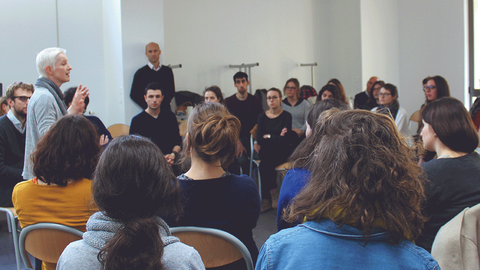
New horizons for education: Programs include courses on the climate, energy and the living world; approaches that encompass design and ethics; and fourth-year project management training. A partnership with the Champs Libres cultural centre and a range of conferences keep students abreast of academic and intellectual life and the thinkers tackling contemporary issues.
A program with vocational high schools created in 2022 lets students develop skills in hands-on professions like pastry making, woodworking and landscaping. In exchange, vocational high school pupils come to Sciences Po Rennes.
Sciences Po Rennes has also developed an executive education program of short courses, validation of experience (VAE) schemes, Master’s and equivalent courses for learners that have already begun their career.
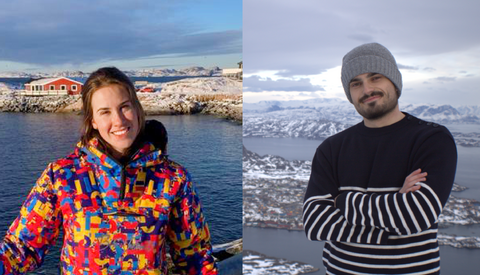
A school anchored in western France and open to the world
Sciences Po Rennes is anchored in western France, in its historical cloister at its Rennes campus, its Transitions campus in Caen, its new programs in Nantes in design, ethics and public policy, and in Brest, where it offers programs in urban and maritime governance. These programs of study, driven by regional dynamics and resources, combine the public, private and non-profit sectors.
Our school has over 175 partnerships with universities around the world to offer students a wide range of choices for their third year abroad. A double French-German degree and a World of China curriculum are also offered. The Caen campus has developed a number of initiatives in Northern Europe. Students can now learn a third language (Arabic, Chinese, Russian) throughout their course of study.
“Taking care of the world”: a community, implication and support at Sciences Po
In addition to educational and academic excellence, Sciences Po Rennes is home to a highly rewarding and dynamic student life. Life at the Cloister in Rennes and the approachable size of the Caen campus are conducive to socializing and events, including Galart’ and the student Carnival.
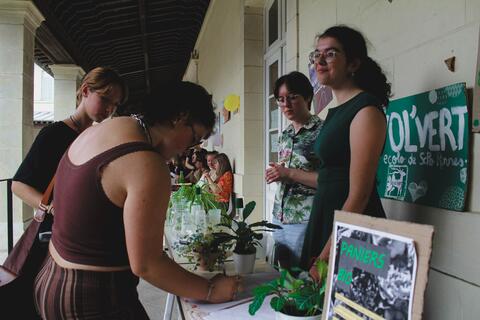
Students can play leisure sports on Thursday afternoons or try a cultural activity. Through a volunteer tutoring service, new students receive help from second-year peers. The implementation of well-being, health and prevention measures include workshops on preventing sexist and sexual violence, a counselling unit, and access to an on-campus psychologist and student health services. Specific financial aid initiatives are available for students in need.
Sciences Po Rennes was the first institute of political science to establish a social and environmental responsibility (SER) department and has launched an extensive campaign to renovate campus buildings, connect them to the heating network, improve insulation and ensure accessibility. Every year, our school provides cultural, linguistic and employment search support to asylum seekers who are new in France via a program led by students and faculty.
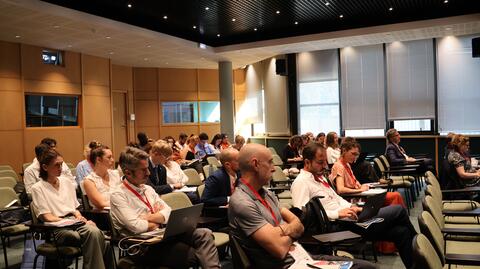
A research center on the future of regions and public policy
In pursuit of its purpose, Sciences Po Rennes seeks to work with society to help meet today’s challenges.
Reinventing institutions, strengthening democracy
Sciences Po Rennes works with the Arènes laboratory, a CNRS research center, with a focus on a number of priorities in cross-disciplinary research: transitions and social change, inequalities and democracy, regions and governance.
The Regions and Changing Trends in Public Policy (TMAP) Chair specifically explores transformations in public policy. Every year, a summer school is held by the Chair, along with seminars on different topics. A series of publications takes this work even further.
The Jean Monnet Chair explores new trends in European and international trade policies, as well as citizen participation from the local to European level.
Meeting global challenges for humanity and the living world
The peaceful coexistence and interaction between the different populations on our planet is a key challenge for the future.
The Normandy Chair for Peace works to develop legal expertise on the rights of future generations with the aim of protecting the future and preventing ecocides.
Uniting and empowering young people
Sciences Po Rennes is a co-founder and partner of “Our futures: over to the next generation”, an event hosted by high school and post-secondary students and sponsored by the Champs Libres cultural center, Rennes city council and the newspaper Le Monde.
The event invites young people to explore the notion of transitions and identify issues that matter to them and are a source of debate, such as the green transition, nutrition, work, sexuality and gender, citizen participation, inequalities and solidarity.
“Our Futures” reflects the interests, practices, doubts and expectations of the next generation in the form of meetings, workshops, screenings, fashion shows, games, exhibits, moot court events, and more.
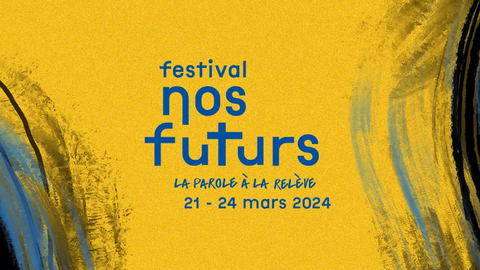
Key figures
1400
Students
125
International students
105
Permanent members of staff
550
External contributors
150
International partners
20
Programs
